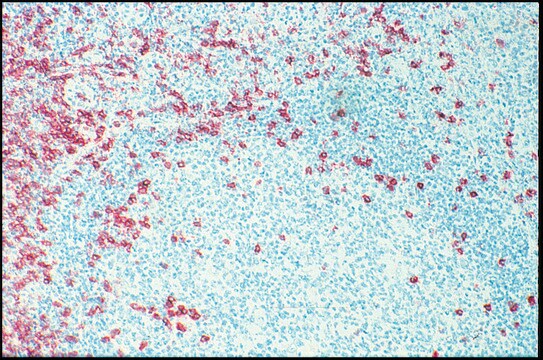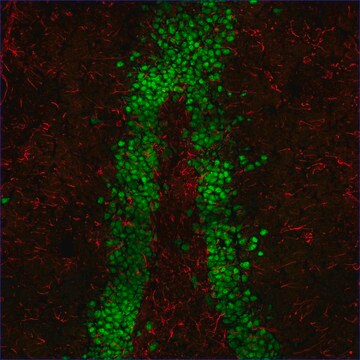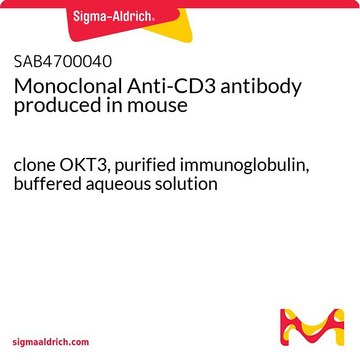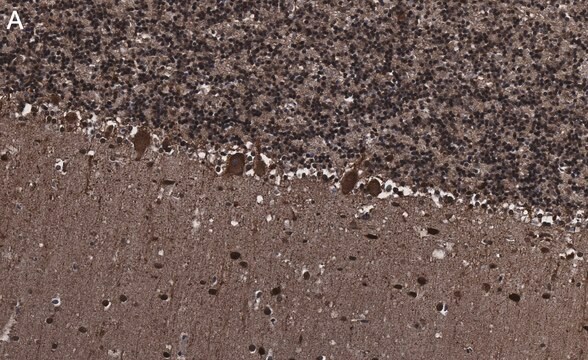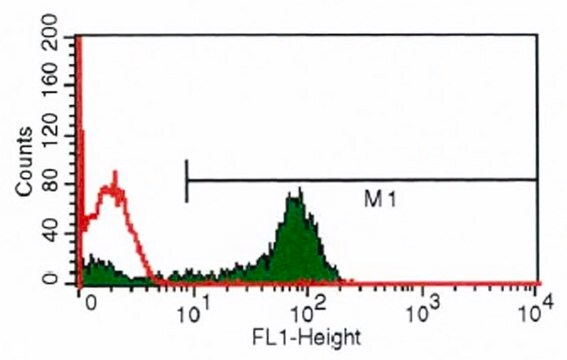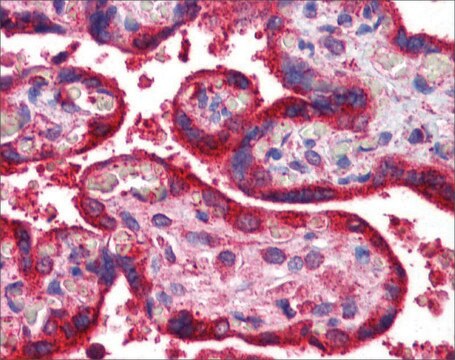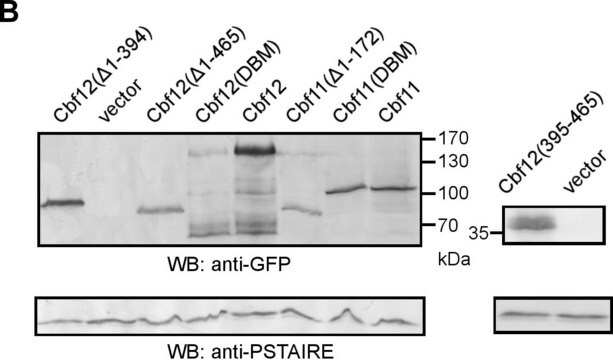SAB4700084
Monoclonal Anti-CD8 antibody produced in mouse
clone MEM-31, purified immunoglobulin, buffered aqueous solution
Autenticatiper visualizzare i prezzi riservati alla tua organizzazione & contrattuali
About This Item
Codice UNSPSC:
12352203
NACRES:
NA.41
Prodotti consigliati
Origine biologica
mouse
Coniugato
unconjugated
Forma dell’anticorpo
purified immunoglobulin
Tipo di anticorpo
primary antibodies
Clone
MEM-31, monoclonal
Stato
buffered aqueous solution
Reattività contro le specie
human
Concentrazione
1 mg/mL
tecniche
flow cytometry: suitable
Isotipo
IgG2a
N° accesso NCBI
Condizioni di spedizione
wet ice
Temperatura di conservazione
2-8°C
modifica post-traduzionali bersaglio
unmodified
Informazioni sul gene
human ... CD8(925)
Categorie correlate
Descrizione generale
The antibody MEM-31 recognizes a conformationally-dependent epitope of CD8, a cell surface glycoprotein found on most cytotoxic T lymphocytes that mediates efficient cell-cell interactions within the immune system. CD8 is a disulfide-linked dimer and exists as a CD8 alpha/alpha homodimer or CD8 alpha/beta heterodimer (each monomer approx. 32-34 kDa).
Immunogeno
Crude thymus membrane fraction
Applicazioni
The reagent is designed for Flow Cytometry analysis. Suggested working dilution for Flow Cytometry is 1 μg/mL of sample. Indicated dilution is recommended starting point for use of this product. Working concentrations should be determined by the investigator.
Caratteristiche e vantaggi
Evaluate our antibodies with complete peace of mind. If the antibody does not perform in your application, we will issue a full credit or replacement antibody. Learn more.
Stato fisico
Solution in phosphate buffered saline, pH 7.4, with 15 mM sodium azide.
Esclusione di responsabilità
Unless otherwise stated in our catalog or other company documentation accompanying the product(s), our products are intended for research use only and are not to be used for any other purpose, which includes but is not limited to, unauthorized commercial uses, in vitro diagnostic uses, ex vivo or in vivo therapeutic uses or any type of consumption or application to humans or animals.
Non trovi il prodotto giusto?
Prova il nostro Motore di ricerca dei prodotti.
Codice della classe di stoccaggio
10 - Combustible liquids
Punto d’infiammabilità (°F)
Not applicable
Punto d’infiammabilità (°C)
Not applicable
Scegli una delle versioni più recenti:
Possiedi già questo prodotto?
I documenti relativi ai prodotti acquistati recentemente sono disponibili nell’Archivio dei documenti.
Tetsuhiro Kanazawa et al.
Clinical cancer research : an official journal of the American Association for Cancer Research, 20(19), 5075-5084 (2014-08-15)
Epstein-Barr virus (EBV) infects not only B cells but also T cells and natural killer (NK) cells, and T- and NK-cell lymphoproliferative diseases (T/NK-LPD) that are refractory to conventional chemotherapies may develop. To identify a molecular-targeted therapy for EBV-associated T/NK-LPDs
Netanya G Sandler et al.
The Journal of infectious diseases, 210(10), 1549-1554 (2014-05-28)
Abnormal levels of inflammation are associated with cardiovascular disease and mortality in human immunodeficiency virus (HIV)-infected patients. Microbial translocation, which may cause inflammation, is decreased by sevelamer in patients undergoing hemodialysis. In this single-arm study, we evaluated the effects of
Sae-Kyung Lee et al.
Clinical cancer research : an official journal of the American Association for Cancer Research, 20(13), 3485-3495 (2014-05-07)
The low immunogenicity of many cancer cells and the immunosuppression by various cancers and anticancer therapies have been an obstacle in the development of efficacious immunotherapies. Our goal was to test whether Toll-like receptor (TLR) agonists and anticancer chemotherapeutic agents
Yongjun Sui et al.
The Journal of clinical investigation, 124(6), 2538-2549 (2014-05-20)
Vaccines are largely evaluated for their ability to promote adaptive immunity, with little focus on the induction of negative immune regulators. Adjuvants facilitate and enhance vaccine-induced immune responses and have been explored for mediating protection against HIV. Using a regimen
Helena Janols et al.
Journal of leukocyte biology, 96(5), 685-693 (2014-06-15)
The causative microorganisms dictate the type of MDSC generated in sepsis patients, and a large proportion of PMN-MDSCs in gram-positive sepsis includes immunosuppressive myeloid blasts. MDSCs constitute a heterogeneous population of immature myeloid cells that potently suppress immune responses. They
Il team dei nostri ricercatori vanta grande esperienza in tutte le aree della ricerca quali Life Science, scienza dei materiali, sintesi chimica, cromatografia, discipline analitiche, ecc..
Contatta l'Assistenza Tecnica.